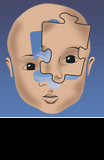Research
Oxford and Reading Cognitive Health After Recovery from acute illness and Delirium -Prospective Study (ORCHARD-PS)
Identifying older patients at high short-term risk of dementia using routinely collected hospital electronic clinical and brain imaging data to improve care.
The aim of ORCHARD-PS is to understand what causes new or worsened confusion (so-called delirium) in older hospital patients and to identify those at high risk of future dementia using clinical information, brain scan pictures and blood tests.
Over half of people admitted to hospital are aged 65 or older. During admission, healthcare staff enter medical information into the patient's electronic patient record (EPR).
Often, patients have scans to provide pictures of the brain, e.g. to check for injury after a fall and are usually done using a CT-scanner, which provides pictures quickly and easily.
Many older patients are at high risk of delirium and future dementia because of multiple conditions and the effects of hospital illness.
We want to understand why some patients get delirium in hospital. We also want to be able to predict who will recover well after hospital discharge and who is at high risk of problems with thinking and memory over the next three years.
To achieve this, we will collect clinical information from patients using questionnaires and from EPRs, do brain scans using a new generation CT-scanner, and take blood samples to look for markers of infection and inflammation and genetic factors.
For both delirium and dementia, we will develop risk scores using information from clinical information, brain scans and blood tests
Eventually, these risk scores will be shown in the EPR to help healthcare staff provide better care for patients. In addition, our work will help understand why delirium occurs in older people in hospital and which patients are at-risk of future dementia. This will help design trials of preventive treatments for delirium and dementia in the future.
Our proposal has been developed in collaboration with hospital patients, carers and the Alzheimer's Society.
Oxford and Reading Cognitive Comorbidity, Frailty and Ageing Research Database - Electronic Patient Records (ORCHARD-EPR)
We have created a research database, the Oxford and Reading Cognitive Comorbidity, Frailty and Ageing Research database - Electronic Patient Records, (ORCHARD-EPR) with ethical approval (reference 23/SC/0258).
ORCHARD extends audit / service development projects already undertaken within Oxford University Hospitals NHS Foundation Trust (OUH) to inform the care of patients with cognitive impairment, complex comorbidity, and physical frailty.
As a result of our previous work, OUH has introduced the OUH cognitive screen which is now embedded in the OUH Electronic Patient Record (EPR).
The database holds routinely acquired data on OUH adult inpatients or acute ambulatory care patients including:
- demographics (age, sex)
- cognitive function - Abbreviated Mental Test Score (AMTS)
- delirium and dementia diagnoses
- clinical details including comorbidities
- inpatient complications including falls and pressure sores
- length of stay
- discharge destination
- mortality
- readmission
- observations (e.g. heart rate, blood pressure)
- laboratory results
- brain scans.
Anonymised clinical data are obtained from the OUH Information Team and transferred to the database. Data are stored in a secure University of Oxford computing environment, controlled by researchers based at the Wolfson Centre for Prevention of Stroke and Dementia (CPSD).
The research database will be used to examine the prevalence and associated complications of cognitive comorbidity (dementia, delirium, other cognitive impairment), all-cause co-morbidity and physical frailty across different specialties in OUH and their association with adverse outcomes including falls, pressure sores, length of stay, mortality and readmission as well as trends over time.
In order to determine the predictive value of cognitive and physical frailty markers for subsequent cognitive decline and dementia, ORCHARD-EPR is linked to the Oxford Health Clinical Record Interactive Search database (CRIS) which provides data on dementia and other mental health outcomes.
The plan is for ORCHARD-EPR to be expanded to contain similar anonymised EPR data from the Royal Berkshire Hospitals NHS Foundation Trust.
If you would prefer that your anonymised routinely acquired data is not used in ORCHARD-EPR, please contact us.
Maxine Florey-Hill: maxine.florey-hill@ndcn.ox.ac.uk
Tel: 01865 231603
ORCHARD Study - Nuffield Department of Clinical Neurosciences
Chief Investigator, ORCHARD-PS and ORCHARD-EPR
Professor Sarah Pendlebury DPhil FRCP FESO
Professor of Medicine and Old Age Neuroscience




























































